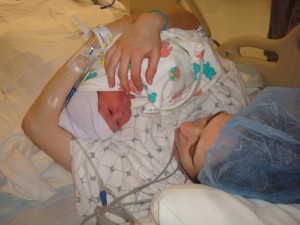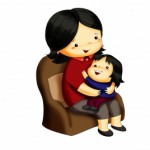Editor’s note: April is Cesarean Awareness Month, an international observance designed to reduce unnecessary Cesareans, advocate for Vaginal Birth After Cesarean (VBAC) and help women heal from the sometimes-difficult emotions surrounding a Cesarean birth. Attachment Parenting International‘s First Principle of Parenting: Prepare for Pregnancy, Birth and Parenting advocates for parents to research their options regarding childbirth choices. While API promotes choices with the least interventions possible, Cesareans are necessary in some situations. But a Cesarean does not need to prevent a gentle delivery:
When I was 7 months pregnant with my third baby, we learned that the baby was in breech position.
That had been my concern all along. My second baby had been breech as well, only we hadn’t found out until I was at the hospital in labor. Since I’d already had a vaginal delivery the first time around and now had a midwife and a doula, I felt confident about my ability to have a VBAC if my baby was in the right position. Apparently my baby had plans of her own.
My midwife gave me a list of 17 things to try over the next several weeks that might encourage the baby to flip. Searching the internet, I found half a dozen more, plus variations of several of them. I was incredibly overwhelmed. I felt like I had to try everything. What if I didn’t do one thing and that was the one that would have made the baby turn? What if I only did something twice a day when I should be doing it three or four or 10 times? What if I was doing it wrong altogether?
The idea of a second Cesarean had me overly stressed and anxious. I was so preoccupied with doing things that might help me avoid it that I felt like I was taking time away from my sons, and I wasn’t enjoying my pregnancy.
Finally my doula helped me realize that I couldn’t do everything. I had to pick the few things that felt right to me. I was still giving my baby plenty of opportunities to turn. My doula helped me remember that some babies simply don’t want to flip, or can’t for some reason.
For the rest of the pregnancy, I was able to focus on doing what felt right for my body and my baby. Hypnobabies helped me relax. I reminded myself that even if a chiropractic adjustment didn’t give the result I wanted, it was still good for my body. Instead of worrying about the things I tried not producing automatic results, I turned my attention to making the impending Cesarean a positive experience.
I took back control of my birth.
I researched gentle Cesareans, where the baby is walked out slowly, and created a Cesarean birth plan. I spoke with an obstetrician about my desire for immediate skin-to-skin contact and having the baby with me in the recovery room. He took the time to go through my birth plan with me and addressed his concerns in a fair, respectful way.
Going into the Cesarean, I was able to feel at peace, to feel prepared. Unlike with my previous Cesarean, which I didn’t know would happen in advance, this time I was lucky to be able to process the emotions surrounding it beforehand.
 My baby girl was born on April 30, 2014, eight days after my oldest son turned 4 and 18 days after my second son turned 2. After the doctor told me my baby was a girl, everything became a blur. I do know that once they gave her to me, she never left my side. She rode with me to the recovery room and stayed there the whole time, nursing. All that night she wanted to stay cuddled up against me, and that was fine with me.
My baby girl was born on April 30, 2014, eight days after my oldest son turned 4 and 18 days after my second son turned 2. After the doctor told me my baby was a girl, everything became a blur. I do know that once they gave her to me, she never left my side. She rode with me to the recovery room and stayed there the whole time, nursing. All that night she wanted to stay cuddled up against me, and that was fine with me.
I took back control of my birth.









